Discography CCR - John Fogerty
Unquestionably one of the greatest American rock
bands ever, Creedence Clearwater Revival will best be remembered for their
unique bayou sound popularized in songs like "Proud Mary" and
"Green River."
The 1967 release of the band's debut album Creedence Clearwater Revival
paralleled the flowering of the San Francisco music scene, but the Creedence
phenomenon had little in common with the "San Francisco Sound." That
first LP contained rock standards such as Dale Hawkins's "Susie Q" and
Screamin' Jay Hawkins's "I Put a Spell on You," as well as original
material by John Fogerty, who was to emerge as one of rock's most influential
songwriters. "Susie Q" was an immediate hit, soon followed by "I
Put a Spell on You."
With the release of their second album, Bayou Country, it became evident that
Creedence had an uncanny knack for writing hits. Their astounding string of
successes continued with "Born on the Bayou," "Bad Moon
Rising," and "Lodi."
By 1970, CCR had undeniably become the number one American rock and roll
attraction.
The man responsible for their exalted position was John Fogerty. In addition to
writing the band's material and producing their records, John sang with a
powerful, raw-edged voice that was the Creedence sound.
The same genius responsible for Creedence's tremendous popularity, however, also
contributed to their eventual demise. Tensions arose among the other group
members as they vied for greater say in band decisions which had, till then,
been made exclusively by John. An agreement for more democratic decision-making
was reached, but came too late for Tom Fogerty, who left the band in 1971 to
pursue a solo career
ALBUMS CREEDENCE
CLEARWATER REVIVAL & JOHN FOGERTY
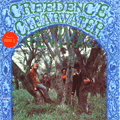 CREEDENCE
CLEARWATER REVIVAL
CREEDENCE
CLEARWATER REVIVAL
With the release of this extraordinary debut album in July 1968, Creedence Clearwater Revival was launched upon a career that little more than a year later would lead to enormous worldwide popularity. The four-man group from San Francisco's East Bay had worked ten years as a bar band and recorded several singles on the Scorpio label (under the forgettable name the Golliwogs), but it was with this Fantasy release that CCR caught fire. Lead singer/guitarist/writer John Fogerty emerges as a fine lyric shouter with "Ninety-Nine and a Half," "I Put a Spell on You," and "Suzie Q," a brilliant extended rendition of the Dale Hawkins classic that quickly became a Top Ten hit.
I Put a Spell on You, The Working Man, Suzie Q, Ninety Nine and a Half, Get Down Woman, Porterville, Gloomy, Walk on the Water
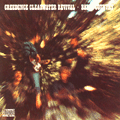 Bayou Country
Bayou Country
A bona fide rock classic, Bayou Country (released in January 1969) broke CCR wide open nationally and worldwide, containing the group's first big hit "Proud Mary" (b/w "Born on the Bayou," which enjoyed similar success). These two tracks, along with "Bootleg," "Graveyard Train," and "Keep on Chooglin'," were pure CCR--gritty vocals, tight leads, and infectious rhythm. John Fogerty's lyrics evoked a Mississippi and bayou folk legend, a world of voodoo fortune tellers, hoodoos, and hound dogs and, together with his raspy-voiced delivery, prompted wide speculation that the El Cerrito, California band was of southern origin. Before the year was out, 35 artists had cut cover versions of "Proud Mary" while the Bayou Country album itself seemed unkillable, remaining on the Billboard charts for 87 weeks and becoming CCR's first platinum LP.
Born on the Bayou, Bootleg, Graveyard Train, Good Golly Miss Molly, Penthouse Pauper, Proud Mary, Keep on Chooglin'
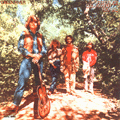 Green
River
Green
River
By the summer of 1969 Creedence Clearwater Revival was firmly ensconced as the American dance band, continuing to churn out hugely successful hit singles, four of which are on this album (released in August 1969). The title cut "Green River," along with "Commotion," "Bad Moon Rising," and "Lodi," were Top Ten singles in the classic rockabilly/R&B tradition and together made this LP the group's first #1 album on the Billboard charts. Because of a penchant for developing tight, carefully crafted material before entering the studio, CCR recorded Green River in an astounding two and a half days, after which the LP remained on the charts for 88 weeks, earning the group its second platinum LP.
Green River, Commotion, Tombstone Shadow, Wrote a Song for Everyone, Bad Moon Rising, Lodi, Cross-Tie Walker, Sinister Purpose, The Night Time Is the Right Time
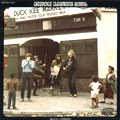 Willy
and the Poor Boys
Willy
and the Poor Boys
So popular was CCR worldwide that by 1970 the group was consistently scoring hits on both the A and B sides of its singles, a feat previously accomplished only by Elvis Presley and the Beatles. This LP, released in November 1969, proved no exception, containing "Fortunate Son" and "Down on the Corner," the latter becoming one of CCR's biggest hits to date. Fogerty's fine gritty voice and his tight vocal overdubbing are standouts, along with his excellent renditions of "Cotton Fields" and "Midnight Special." Willy and the Poor Boys remained on the Billboard charts for 60 weeks, scoring as high as #3 and garnering for the group its third platinum LP.
Down on the Corner, It Came Out of the Sky, Cotton Fields, Poorboy Shuffle, Feelin' Blue, Fortunate Son, Don't Look Now, The Midnight Special, Side o' the Road, Effigy
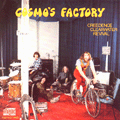 Cosmo's
Factory
Cosmo's
Factory
Cosmo's Factory--the name drummer Doug "Cosmo" Clifford gave CCR's rehearsal studio because so many hits were created there--lived up to its namesake in spades. Released in July 1970, the album contained more hit singles (six) than any other CCR LP, achieved multi-platinum status, and became the band's all-time best-selling album both in the U.S. and worldwide (69 weeks on the Billboard charts), In addition, the trailblazing extended version of "I Heard It Through the Grapevine" (which Rolling Stone pronounced "more intense than any six minutes of Grateful Dead music on record") was never released as a single during the group's heyday but received enormous AM and FM airplay, boosting both the song and the LP to #1 on all three trade music charts.
Ramble Tamble, Before You Accuse Me, Travelin' Band, Ooby Dooby, Lookin' Out My Back Door, Run Through the Jungle, Up Around the Bend, My Baby Left Me, Who'll Stop the Rain, Heard It Through the Grapevine, Long as I Can See the Light
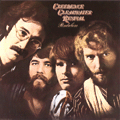 Pendulum
Pendulum
Creedence Clearwater Revival's sixth album, released in December 1970, was aptly named for it represented the last LP the songs and arrangements for which lead singer/writer/guitarist John Fogerty would be solely responsible. After four years of nearly nonstop performing, CCR sounds as polished and tight as ever on this album. Of the two hit singles from this LP, "Hey Tonight" and "Have You Ever Seen the Rain," the latter's slower ballad format clearly suggests the band was exploring new areas of its music, including a developing emphasis on instrumentals. With this swing of the pendulum the creative tasks would in the future be shared by all members of the group. A fine and tasty offering, Pendulum marks not only the end of an era but is the last LP to be recorded by all members of the original band, one that is still universally acknowledged as among the greatest in the annals of rock.
Pagan Baby, Sailor's Lament, Chameleon, Have You Ever Seen the Rain?, (Wish I Could) Hideaway, Born to Move, Hey Tonight, It's Just a Thought, Molina, Rude Awakening #2
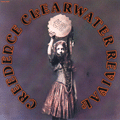 Mardi
Gras
Mardi
Gras
The release in April 1972 of Mardi Gras marked CCR's recorded farewell as
a musical entity after five enormously successful years. Yet this album, as its
title suggests, is more a celebration than swan song. With the departure of
guitarist Tom Fogerty a year previously, the group worked closely as a trio,
sharing writing and singing as well as production. The results were gratifying,
yielding two Fogerty-penned hit singles, "Sweet Hitch-Hiker" and
"Someday Never Comes," and showcasing drummer Doug Clifford (notably
in "Tearin' Up the Country") and bassist Stu Cook, who indeed cooks on
"Door to Door." Fogerty's rendering of the Gene Pitney classic
"Hello Mary Lou" is flawless while his "Looking for a
Reason" presages his future interest in exploring c&w music.
Lookin' for a Reason, Take It Like a Friend,
Need Someone to Hold, Tearin' Up the Country, Someday Never Comes, What Are You
Gonna Do, Sail Away, Hello Mary Lou, Door to Door, Sweet Hitch-Hiker
JOHN FOGERTY
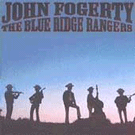 BLUE
RIDGE RANGERS
BLUE
RIDGE RANGERS
John Fogerty's first solo effort, after the untimely demise of Creedence Clearwater Revival. However, he wanted to make it appear that a band was still in existence, and he conceived of The Blue Ridge Rangers, although he performed every instrument himself! From the amazing Creedence catalog, we already knew he was an accomplished guitar, harmonica, saxophone, and keyboard (piano and organ) player, but now we learn he also plays drums, bass, banjo, and the fiddle well!
Blue Ridge Mountain Blues - Somewhere Listening (For My Name) - You're The Reason - Jambalaya - She Thinks I Still Care - California Blues - Workin' On A Building - Please Help Me I'm Falling - Have Thine Own Way, Lord - I Ain't Never - Hearts Of Stone - Today I Started Loving You Again
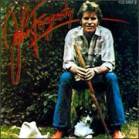 John
Fogerty
John
Fogerty
John Fogerty singlehandedly prepares records that are virtually perfect
in execution as well as conception: brilliantly concise self-expression,
captivating and broad-based radio music. Seven of the ten tracks on this first
official solo album were written by Fogerty. Fogerty's drums, guitars, saxes and
vocals are made to sound just so, not only on new readings of the vintage
"Lonely Teardrops" and "Sea Cruise" but also on the
originals, like "Almost Saturday Night or "Flyin' Away," which
gives the Doobie Brothers riff new resonance.
Rockin' All Over The World - You Rascal You - The Wall - Travelin' High - Lonely Teardrops - Almost Saturday Night - Where The River Flows - Sea Cruise - Dream Song - Flying Away
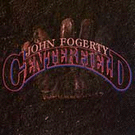 Centerfield
Centerfield
On Centerfield he once again plays every instrument himself, and the execution
is flawless. As ever, Fogerty deploys rock's most primal idioms - Sun-sound
rockabilly, Dale Hawkins-style swamp-funk and of course the classic three-chord
chug - in a distinct and timeless musical language that is wonderfully
unpretentious and, despite its obvious models, utterly convincing. Centerfield
leads off with a terrific one-two punch. "The Old Man Down the Road,"
with its tart gumbo guitar riff and writhing rhythms, could pass as a previously
undiscovered nugget from the classic Creedence canon; and the terrific,
yodel-tinged "Rock and Roll Girls," which follows hot on its grooves,
is a rather spectacular demonstration of what still can be done with three
shitty chords and a blatzing sax.
Centerfield is rock & roll under glass, and while a lot of it is great rock
& roll
The Old Man Down The Road - Rock And Roll Girls - Big Train (From Memphis) - I Saw It On TV - Mr. Greed - Searchlight - Centerfield - I Can't Help Myself -Vanz Kant Danz
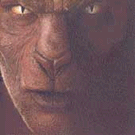 Eye
Of The Zombie
Eye
Of The Zombie
Oddly, Zombie opens with an instrumental, "Goin'
Back Home." On that track, Fogerty's forlorn, feedback-laced guitar solo
floats over a dreamy, hymn-like synthesizer melody. Then "Eye of the
Zombie," a sort of third-rate "Thriller" ("A beast already
dead/Comes to join the dance of the zombie"), instantly shatters the calm.
"Headlines," a refried boogie riff posing as a song, follows,
featuring Fogerty shrieking about news reports that "gotta million ways to
say/Another crazy day."
Fogerty's at his most engaging on "Knockin' on Your Door," a gritty
jolt of Stax-Volt R&B, and "Change in the Weather," a chooglin'
swamp rocker, nearly seven minutes long, that fixes the master firmly in his
element. On those tunes, Fogerty's newly assembled rhythm section - bassist Neil
Stubenhaus and drummer John Robinson - locks in tight while Fogerty scratches
rhythms and sweats out steamy leads
Goin' Back Home - Eye Of The Zombie -
Headlines - Knockin' On Your Door - Change In The Weather - Violence Is Golden -
Wasn't That A Woman - Soda Pop - Sail Away
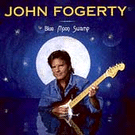 Blue
Moon Swamp
Blue
Moon Swamp
John Fogerty spent five years in research and development for "Blue
Moon Swamp," traveling through the Deep South for inspiration and mastering
the dobro and the bottleneck guitar. Of course, anyone with a Creedence
Clearwater Revival greatest-hits album knows that Fogerty already had that
bayou-blues template down cold 30 years ago -- without leaving Northern
California. But on "Blue Moon Swamp," Fogerty's road trips and
remedial picking lessons paid off in the bracing, moonlit-night air of the music
and the mature, focused luster of his singing, particularly in the radiant
company of old gospel choristers the Fairfield Four on "A Hundred and Ten
in the Shade."
These and other little jewels appear on Blue Moon Swamp, probably the best solo
album John Fogerty has ever made so far.
Southern Streamline - Hot Rod Heart - Blueboy - 110 In The Shade - Rattlesnake Highway - Bring It Down To Jellyroll - Walking In A Hurricane - Swamp River Days - Rambunctious Boy - Joy Of My Life - Blue Moon Nights - Bad Bad Boy